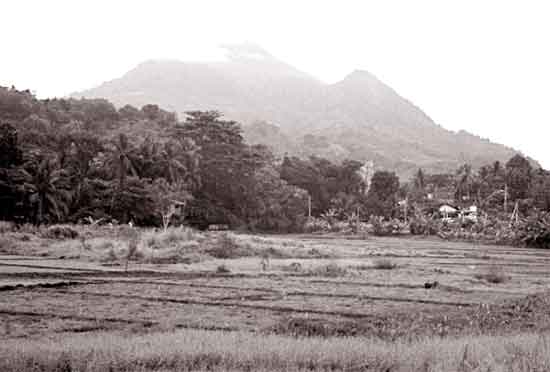A day at Punchi Dambadiva
by Gamini G. Punchihewa
Lumbini where Prince Siddartha was born is situated in India, which
was earlier known as Dambadiva. It was a little pastoral village
nestling in this mountain frontier of Nepal in the 6th century BC.
Right throughout the year in Sri Lanka there is an exodus of pilgrims
on pilgrimage to Dambadiva, where the hallowed sites connected with the
life and times of Siddharta Gautama before and after His Supreme
Enlightenment are found.
However Punchi Dambadiva (Little Dambadiva) is located along the
Colombo - Ratnapura - Pelmadulla - Embilipitiya main highway - near
Nonagama Junction off the 22nd km post from Ratnapura. From there lies
its turn off along a mountain winding metalled narrow road running to
about 12 km.

This Punchi Dambadiva reposes itself in the lap of the Sabaragamuwa
Province, where in the hazy distance loom the holy mountain profiles of
Sri Pada (Adam’s Peak), the holiest peak of all the peaks in our fair
isle.
The verdant valleys are saddled copiously with carpets of tea,
rubber, cocoa, coffee gardens, interlaced with lush jungle, terraced
rice fields set against the backdrop of wooded hills, where whispering
rills, cascade down falling into boisterous rock pools.
Amidst such awe-inspiring mountain capes, there comes into view this
fascinating Punchi Dambadiva peeping out of a hillock harbouring a
sprawling complex of lofty mansions filling the spread out landscapes
far and wide. It is fascinatingly skirted by the meandering Rath Ganga
flowing lazily by.
Ven. Girimale Chandraloka Thera is the dynamic Viharadhipathi -
Founder of this temple named Rathganga Asu Maha Shrawaka Pas Visu
Rajamaha Viharaya.
He is a pleasant and devout thera. He welcomed us and most willingly
spent half a day with us in the commodious reception parlour standing on
monolithic pillars elaborately carved with alluring cultural motifs and
furnished with elegant decor which has turned into a cynosure to any
pilgrim.
Adjoining it are the enormous living rooms for the comfort of the
devotees for their lodgings replete with well-equipped shining
assortments of furniture and other fittings of every description.
Everyday pilgrims are provided with meals.
The Viharadhipathi spelled out to me the origin and the concept of
this Punchi Dambadiva Temple Complex.
His most revered ambition in creating it was to have those very
sacred pilgrim sites found in ancient Dambadiva, reminiscent of the
Buddha, to be exactly moulded in their entirety at this Punchi Dambadiva
itself.His other wish was to provide an alternative to the people who
have financial difficulties to go to India on pilgrimage.
In order to fulfil this void, his other intent was to create those
very replicas of such places like Buddha Gaya, Lumbini, Kusinara,
Jethawanaya, at this Punchi Dambadiva. With a twinkle in his graceful
eye, in high glee the thera averred that he has been successful in
fulfilling it by the ‘Grace of the Triple Gem.’
To achieve his sacred goal, with a determined effort fortified with
the unstinted co-operation that he had received from his loyal dayakas,
villagers around and still other well-wishers from outstations as well,
he strode ahead with confidence.
A devout Buddhist Mr. Perera of Panadura rose to the occasion, and
gave the financial assistance to construct a suitable dwelling to enable
the Viharadhipathi to stay in it and carry out this mission. Thereafter,
came the promising and great Day for him and his dayakas on 14.4.1981.
On this paramount day at the auspicious time of 21.17 pm he moved in
with all smiles and contentment into this mud-walled hut clad with tiles
that was graciously donated by this good samaritan Mr. Perera , in the
company of his Dayakayas, and a host of other well-wishers.
Languishing in this shanty like hut under great privation, albeit his
daily alms were provided to him by his dayakas, he geared himself to
make this ambitious mission a reality.
With the generous but steady flow of cash donations doled out by his
dayakas, villagers, and other pilgrims , he was gloriously successful in
the construction of the very first such palatial edifice called the
Dharmasala Mandira for which the foundation stone was laid on 3.6.1982.
When in no time, it was fully completed.
As time grew by, he still strived indefatigably to bring this Punchi
Damabadiva into a plurality of buildings modelled out on the very such
Buddhist sites found in Dambadiva like Buddhagaya, Jethawanarama,
Kusinara, Lumbini and the like.
The first Buddhist Convention during the Buddha’s life times was held
at Jethawanaramaya in Dambadiva in a conclave of eighty Arahants
(highest Buddhist Sages). Among them were Deepankara Buddha, Kassyapa
and Gautama Buddha and so on.
This sanctified event had been spectacularly modelled out in clay
plaster and lime in the form of statues in glittering decor, while the
murals are fascinatingly adorned with the lively episodes of Jataka
Stories depicting the life and times of the Bodisatta and then the
Buddha.
Hence it has been fittingly named as Suvisi Vivarana Vihara Mandiraya.
It comprises of the replicas of Suvisi - (24) Buddha statues, together
with 80 other statues which are consecrated under one roof, are
considered to be the only such models found not only in Sri Lanka, but
in the world.
It was really a marvellous piece of work which took over two years to
complete. This epic Vihara Mandira was unveiled by the former President
late J. R. Jayewardene on June 25,1986.
The foundation stone laying ceremony for yet another massive building
namely the Dharmamandira took place on 15.1.1987, and it was inaugurated
on 21.4.1990 by the former late President Ranasinghe Premadasa.
This Vihara was posthumously named after late Venerable Thudawe Thera
, the Guru of Venerable Girimale Chandraloka thera . |
